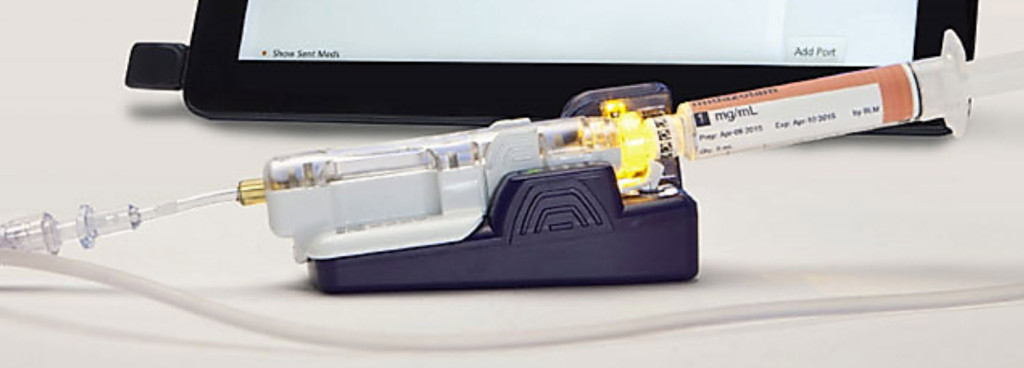Pondering the need for an IV workflow management system (IVWMS)? You’re not alone if you are. According the most recent PP&P State of Pharmacy Automation Survey, 15% of facilities have already implemented something and another 29% plan to do so in the next few years. The only surprise is the relatively low percentage of facilities planning on implementation in the near future.
(more…)
Blog
-
Pros and cons of IV workflow management systems
-
JerryFahrni.com Podcast | Episode 5: RFID Technology in Pharmacy
Jerry talks about the use of RFID technology in pharmacies, specifically the use of RFID in refrigerated consignment programs and medication tray management.
Show Notes:
Host: Jerry FahnriCurrent setup:
Blue Microphones Yeti USB Microphone – Blackout Edition
Dragonpad Pop Filter
Sony MDR-V150 HeadphonesRFID-enabled refrigeration [4:25]:
Cardinal consignment programs [PDF]
FFF EnterprisesRFID-enabled medication tray management systems [7:00]
Intelliguard Kit and Tray Management System by MEPS
KitCheck by KitCheck -
Is multi-dose packaging really a solution to medication adherence?
Multi-dose packaging has been a part of pharmacy for longer than I’ve been a pharmacist. It’s mostly been limited to long term care (LTC), such as nursing homes, rehab facilities, etc. It’s not something that’s commonly used in acute care hospitals for a host of reasons, most notably medication regimens frequently change in acute care settings. Multi-dose packaging works best when the patient is stable and medications can be dispensed for multiple days, hence the popularity in LTC.
Recently articles have been cropping up for companies attempting to use multi-dose packing technology in the ambulatory care setting, i.e. outpatient pharmacy. The most recent of which is an article in the Tampa Bay Times, describing the M5000 robot (1) by MTS Medication Technologies, an Omnicell company. Check the video below.
-
Using data to build proactive drug error prevention models
“Data is variously described as the oxygen of the digital economy or the new raw material of the 21st century.“-Nigel Shadbolt
There are more than a few issues with today’s medication order entry systems. However, in this post I want to focus on only two.
First, alert fatigue. As a pharmacist that has entered his fair share of orders I can tell you that alert fatigue is real. Order entry systems, including CPOE, are designed to indiscriminately alert users of every possible problem associated with the patient’s profile and the order being entered. When entering orders for a patient with complex medical conditions, this can become a bit frustrating because a majority of these alerts are of little to no value. After a while you begin to blow through alerts because so many are simply a waste of your time. Unfortunately, when this happens you will occasionally miss something important. It happens.
Second, the “perfect medication error”.(1) This occurs when a physician inadvertently utilizes CPOE to order the wrong medication for a patient – or the right drug for the wrong patient – but the order meets all the necessary checks and balances to end up on the medication profile, i.e. no allergies, meets all appropriate dosing parameters, there are no drug-drug interactions, labs are fine, and so on. This is an issue that appeared on my radar while performing an FMEA for a CPOE implementation when I was still working as an IT pharmacist.
(more…) -
Saturday morning coffee [August 22 2015]
“Don’t accept that others know you better than yourself. Work joyfully and peacefully, knowing that right thoughts and right efforts will inevitably bring about right results.” – James Allen
The mug below comes from the University of Arizona in Tucson. I was there earlier in the week doing some research on a project. In fact, I’m sitting in a hotel in downtown Phoenix this morning as I write this. I’ll be heading home later today. I saw this mug in a display case in the U of A bookstore. It’s an awesome looking mug. I wanted one, but couldn’t bring myself to purchase it because, well, you know, my daughter is a UCLA cheerleader. Having a U of A mug in the house would be akin to blasphemy. It really is a beautiful mug though.
-
It’s time for pharmacy to find ways to collect and share information
Regardless of what everyone thinks, the healthcare industry is in the infancy of “big dataâ€. The concept isn’t new, but we still have a long way to go, especially in pharmacy. I recall sitting at conferences years ago listening to sessions describing data collection and manipulation. The problem has been that data, especially that found in pharmacies is scattered across disparate systems without an effective method for connecting the dots. The adoption of electronic health records (EHRs) has made things better, but much of the data collected in an average acute care pharmacy is outside the EHR’s reach.  And to say that most pharmacies have their collective heads buried in the sand, would be putting it kindly.
Those on the outside often find it difficult to understand the sheer volume of data that’s produced in a pharmacy. Unfortunately, the data sources are mostly stored in disparate systems creating silos, which makes each system blind to the others. Is is possible to connect the systems and exchange data? Sure, but few if any are doing it.
Data sources in pharmacies come from places like clinical interventions, inventory management, cost containment strategies, regulatory compliance, internal communications, and so on.
(more…) -
The Garage | Episode 5: Windows 10
Robert and Jerry get back at it after taking nearly two years off. Crazy how time flies. The brothers talk briefly about Roberts big move to a small town before getting into Windows 10 and OneDrive.
Show notes:
Hosts: Robert and Jerry Fahrni- Windows 10
- OneDrive
- Uservoice page for OneDrive issue with more comments than I can count.
- Ever wonder where Exeter is? Look here.
Questions, tips or recommendations for upcoming Garage topics? Find Jerry on Google+ or Twitter (@JFahrni). Find Robert on Twitter (@Fahrni).

